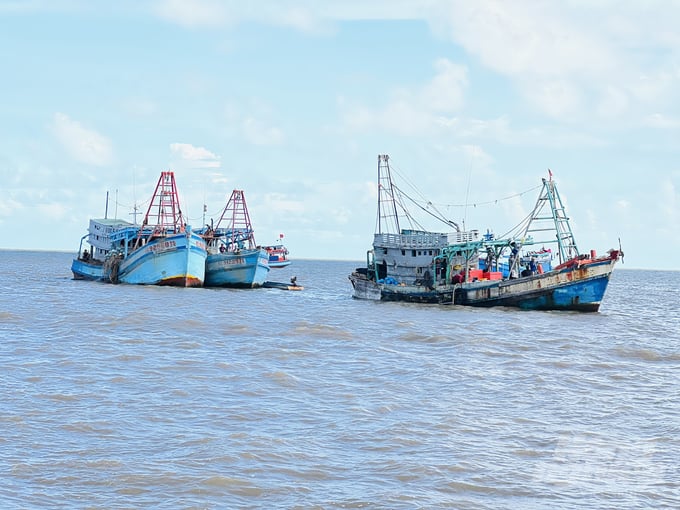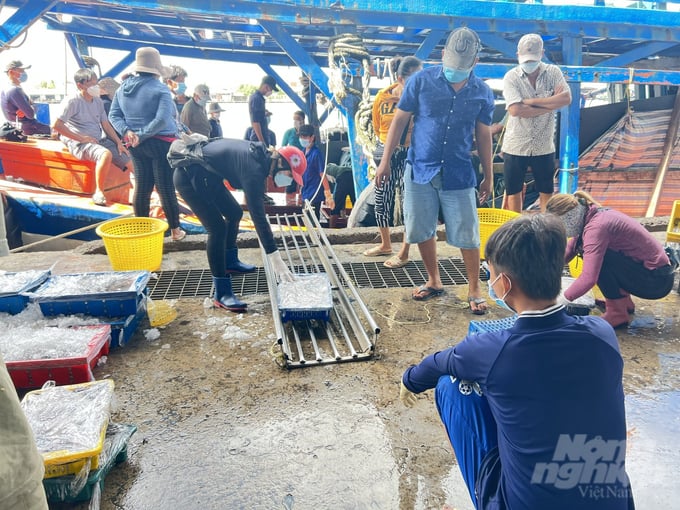June 16, 2025 | 10:38 GMT +7
June 16, 2025 | 10:38 GMT +7
Hotline: 0913.378.918
June 16, 2025 | 10:38 GMT +7
Hotline: 0913.378.918
According to the Ca Mau Provincial Department of Agriculture and Rural Development, the incidence of local fishing vessels invading foreign waters has been decreasing since the beginning of this year, making the situation more complex. Ca Mau province was informed that eight fishing vessels and residents who violated international waters were apprehended between January 1 and July 18.

The situation of fishing vessels in violation of foreign waters in Ca Mau province from the beginning of 2023 until now has tended to decrease. Photo: Trong Linh.
Consequently, the functional forces of Ca Mau province identified and penalized 144 instances of illegal fishing over 5,2 billion VND. There were 88 instances of IUU fishing violations with a total value of over 4,400,000,000 VND and 17 cases of cruise monitoring violations with a total value of nearly 870,000,000 VND. In addition, the province is conducting investigations and managing several cases involving fishing vessels that conceal and transmit tracking devices.
Two fishing vessels registered in Bac Lieu province with the numbers BL-93545-TS and BL-93141-TS have been sold to permanent residents in Ca Mau province since 2022; two fishing vessels registered in Bac Lieu province with the numbers BL-93545-TS and BL-93141-TS have been sold to permanent residents in Ca Mau province since 2022; and two fishing vessels registered in Bac Lieu province with the numbers BL-93545-TS and BL-93141-TS
In addition, the owner of fishing vessel CM-91622-TS confirmed that the vessel was not detained by a foreign nation. Currently, the fishing vessel has a signal from a cruise monitoring device operating in Vietnam's waters and has access to and from the sea gate under the control of competent authorities.

Ca Mau province ensures 100% of fishermen understand the basic provisions of the law on fishing. Photo: Trong Linh.
The province of Ca Mau has prioritized the implementation of strict, effective, and efficient fisheries regulations. Particularly concentrating on implementing regulations on prevention and combat of IUU fishing, preventing, reducing, and eliminating IUU fishing activities of organizations and individuals in the province's waters, and ending the situation of fishing vessels, provincial fishermen illegally exploit seafood in foreign waters. Contributing to the removal of the EC's yellow card warning, promoting responsible and sustainable fisheries development, and contributing to national and regional security as well as international integration.
Mr. Le Van Su, Vice Chairman of the Provincial People's Committee of Ca Mau, assessed that, to reach the goal, the province must ensure that 100 percent of fishermen perceive and comprehend the fundamental anti-IUU fishing law provisions. To date, all vehicles have been registered, marked as fishing vessels, issued fishing licenses, and equipped with a fishing vessel monitoring system (VMS) as required by law.

Ca Mau province resolutely dealt with fishing vessels violating exploitation. Photo: Trong Linh.
Ca Mau province has updated all fishing vessel information in the National Fisheries Database (VNFishbase), and all fishing vessels entering and departing the quay will be inspected and controlled at the border checkpoint. For fishing vessels lying on the shore, losing connection, or crossing the boundary, fishing vessels with a high risk of IUU fishing violations will be controlled and the causes will be understood, records will be kept, images will serve as proof, and specific cases will be dealt with if intentional violations occur.
In addition to regulating 100 percent of fishery output through designated fishing ports, private fishing ports and wharves are used to catch 100 percent of fish. Check and manage all export documents and shipments destined for the European market.
According to the regulations, fishing vessels that violate handling conditions will be punished severely for violations in the field of fisheries and protecting aquatic resources. Update 100 percent of administrative violation sanctioning results into the sanctioning administrative violations database software. Inspect, investigate, and rigorously manage designated fishing ports, private fishing wharves, units providing cruise monitoring equipment, businesses, and related organizations and individuals in the execution of IUU combating responsibilities.
Consolidate the local fisheries management force in the direction of establishing a provincial fisheries surveillance force to ensure sufficient capacity to enforce the law on fisheries at sea, and organize adequate resources and equipment to enhance fisheries management capacity at the fishing port.
Translated by Linh Linh

(VAN) The UNESCO Global Geopark revalidation of Non nuoc Cao Bang and the transition to a two-tier administrative model are presently undergoing a pivotal moment in Cao Bang, the northernmost province of Vietnam.
/2025/06/13/5330-2-004539_953.jpg)
(VAN) Changing policy mindset and removing investment barriers are urgent requirements to open up new development space for enterprises in the agricultural sector.

(VAN) The areas include the restoration of five million hectares of marine ecosystems.

(VAN) Dr. Le Van Nguyen, Director of the Institute of E-Commerce Management (ECM), emphasizes the potential for green development through the cultivation of fruit trees, particularly in provinces such as Son La.

(VAN) VAAS and numerous Vietnamese enterprises have signed cooperation agreements with Japanese partners to promote agricultural technology and trade connectivity.
/2025/05/29/5625-12-214801_567.jpg)
(VAN) Provincial mergers in the Mekong Delta promise to streamline administration, expand inter-provincial raw material areas, and foster close linkages in agricultural value chains, benefiting both businesses and cooperatives.

(VAN) Merging Mekong Delta provinces contributes to the expansion of agricultural raw material areas, addressing previous constraints caused by provincial boundaries. Additionally, this expansion will reduce costs and strengthen linkages between businesses, cooperatives, and farmers.